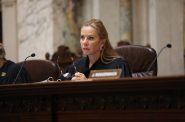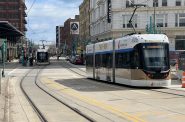We Want More Money For Schools
Across the state, in both blue and red counties, voters are approving more money for schools.
Wisconsin voters want more money for their schools, as a new report by the non-partisan Wisconsin Policy Forum documents.
In the November elections, “voters cast their ballots in favor of 43 out of 51 (84.3%) school referenda totaling nearly $946 million,” the report noted. Combined with the results of referendums in the April election, “Wisconsin voters approved 95 total referenda in 2020” and the 85.6% passage rate for the year is pretty historic: “the second-highest since at least 1993.”
And even when they fail, these referendums often come close to passing, the researchers found: “Of the eight referenda that failed in November, five still managed to garner at least 48% of the vote. A $5.5 million non-recurring referendum in the district encompassing the entirety of rural northern Florence County failed by just 56 votes, and a $155 million debt referendum in Wausau – which would have been the second largest in dollar amount terms – failed by a margin of about 2,500 votes.”
Why so many referendums and why do so many pass? For more than a decade the state Legislature has been squeezing the schools, providing less state support in real dollars while maintaining revenue caps on what school districts can raise through a local property tax. As an earlier WPF study found, “from the 2009-10 school year through 2018-19, inflation rose 17%. Meanwhile, the statewide average revenue limit per pupil for districts increased by $570, or 6%, from $10,107 to $10,677. That figure covers all general state aid and property tax revenues, including referenda and other exceptions allowed under the law.”
In short, even with the school referendums that have passed, total school spending in the state has failed to keep up with inflation. Gov. Tony Evers called for a major increase in state funding for schools in the last budget, but that was trimmed back significantly in the final budget approved by the Republican-led Legislature.
Which continues to leave school districts with no recourse but attempting to pass local referendums to spend more than revenue caps allow, which is legal under state law.
And even in the midst of a difficult economy, beset by the pandemic, taxpayers are passing the referendums.
Polls by Marquette University Law School have repeatedly found that a significant majority of respondents favor spending more money on schools rather than cutting property taxes. And the passage of these referendums in November 2020 came in both blue and red counties, the WPF found: “The data tell a clear story: communities associated with 30 of the 43 districts (69.8%) with successful referenda approved those measures while voting for the Republican presidential candidate…Four referenda we analyzed had a difference between their vote share for Biden and in favor of the referendum of at least 30 points.”
Some Republican legislators have in the past expressed frustration at the high passage rate for these referendums, suggesting that that Legislature might have to put limits on them. But cooler heads in the GOP caucus apparently prevailed. Preventing parents from taxing themselves for their children’s schools is not necessarily a good way to assure a legislator’s reelection. Or as the report concludes: “the elections show that despite increasing polarization, the electorate may be more unified around some issues of local importance.”
If you think stories like this are important, become a member of Urban Milwaukee and help support real, independent journalism. Plus you get some cool added benefits.
Back in the News
-
Justice Ziegler Misquotes US Supreme Court Decision
 Dec 2nd, 2025 by Bruce Murphy
Dec 2nd, 2025 by Bruce Murphy
-
Will West Milwaukee Do Development Near Brewers Stadium?
 Dec 1st, 2025 by Bruce Murphy
Dec 1st, 2025 by Bruce Murphy
-
Key Streetcar Opponent Opposes Effort to Shut It Down
 Nov 10th, 2025 by Bruce Murphy
Nov 10th, 2025 by Bruce Murphy






















This is good they should be getting as much of this additional money into the hands of voucher students as possible. They can then escape many of these poorly performing districts and have a bright future.
More money for schools = smarter tomorrows,
A retired teacher, still delighted when I meet former students at grocery stores or elsewhere.
.